Business
Cashless Policy: CBN Gives Fresh Insight

The Central Bank of Nigeria (CBN) says the transaction charges on bank deposit and withdrawal in furtherance of implementation of its cashless policy is on the amount in excess of the set limits.
The Director, Corporate Communication Department, Mr Isaac Okorafor, made the clarification while speaking within newsmen in Abuja on Monday.
The CBN had on September 17 issued a circular to deposit banks to commence the implementation of the cashless policy in six pilot states across the country.
The CBN explained that transactions would attract three per cent processing fees for withdrawal and two per cent processing fees for lodgement of amounts above N500,000 for individual accounts.
Similarly, corporate accounts would attract five per cent processing fees for withdrawal and three per cent processing fees for lodgement of amounts above N3 million
The apex bank directed that implementation should commence from September 18 in Lagos, Ogun, Kano, Abia, Anambra, and Rivers States, as well as the Federal Capital Territory (FCT).
It, however, stated that the nationwide implementation of the cashless policy would take effect from March 31, 2020.
Okorafor explained that contrary to the misconception on the implementation of the policy, the charges would only be on the excess of N500,000 deposited or withdrawn for individual and N3 million for corporate body
According to him, if an individual deposited N510,000 the two per cent charge would be on the N10,000 excess which is N200 only.
He said the same applied to a withdrawal of same amount, adding that the three per cent charge would be on excess of the set limits.
He said that the same thing also applies to the corporate body five per cent on withdrawal and three per cent on lodgement of amounts above N3 million.
While many Nigerians have welcomed the development as capable of reducing crimes, many others described it as additional burden on banks’ customers who were already laden with other charges by the banks.
The CBN governor, Godwin Emefiele, however stated that the policy was not designed to de-franchise hard working Nigerians as perceived by some categories of people.
According to him, a data conducted, revealed that close to 95 per cent of cash deposited and withdrawn fall below this threshold.
Emefiele said Nigerians had already embraced electronic channels and online transaction in market places.
He added that Micro, Small and Medium Enterprises now had various options and channels available to collect a legitimate payment for goods and services, like POS, banks transfer using ATM, USD code among others.
He said that the cashless policy increases transparency in financial dealings and reduce crimes such as ransom payment and extortion among others.
Transport
Automated Points Concession : FAAN Workers Gave 72hrs To Revise Decisions In PH

Transport
FAAN Announces Pick-Up Points for Go-Cashless Cards

Business
Fidelity Bank To Empower Women With Sustainable Entrepreneurship Skills, HAP2.0
-
Politics3 days ago
2027: NIGERIANS FAULT INEC ON DIGITAL MEMBERSHIP REGISTER DIRECTIVE
-

 Environment3 days ago
Environment3 days agoLAWMA Director Says Sweeping Reforms Have Improved Waste Collection
-
Politics3 days ago
LP Crisis: Ex-NWC Member Dumps Dumps Abure Faction
-

 Politics3 days ago
Politics3 days agoUmahi Dismisses Allegations On Social Media, Insists On Projects Delivery
-

 Sports3 days ago
Sports3 days agoAbia Not Sure To Secure continental Ticket
-
Politics3 days ago
NATASHA ELECTRIC VEHICLES INITIATIVE IN KOGI CENTRAL
-
Sports3 days ago
La Liga: Yamal Records First Career Hat-trick
-

 Sports3 days ago
Sports3 days agoPSG Extend Lead In Ligue 1

